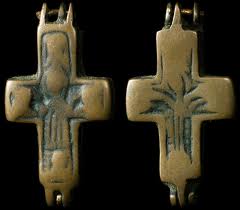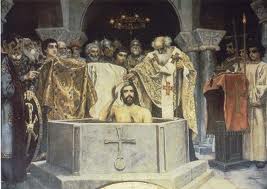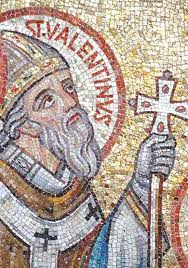|
The first Christian Empire in the world was that of the Byzantine Empire founded by Constantine in 330 A.D. The Byzantine Empire started with the division of the Roman Empire into East and West factions, with the eastern provinces becoming the Byzantine Empire.
The Byzantine Empire had a major influence upon Orthodox Christianity. This was embodied in the Byzantine version of Christianity, which spread Orthodoxy and eventually led to the creation of the "Byzantine commonwealth" (a term coined by 20th-century historians) throughout Eastern Europe.

Since the Byzantine Empire had once been part of the Roman Empire its peoples were also Christians. However in 1054, there was a dispute over the worship of icons. The Christian authorities in the Byzantine disagreed with Rome and did not believe that it was proper to worship icons. As a result the first split in Christianity occurred, with the West continuing to practice Catholicism and the Byzantines practicing Eastern Orthodox. Later divisions of Christianity would come about with the Protestant Reformation in Europe in the 1500s.

When the Roman Emperor Constantine was converted to Christianity, he moved the governing center from Rome to the city of Byzantium, made Christianity the state religion, and created a state that had a profound effect on the social life and outlook of the people. The first moves toward splitting up the Roman Empire had been made by Constantine's uncle, the Emperor Diocletian, who thought that the problems with the empire were related to having too much territory to the east and north out of direct control (Wenzel, 1965: pp. 11-13). The separation did not take place immediately but over a generation or so and would last for more than 1100 years.

Early Byzantine missionary work spread Orthodox Christianity to various Slavic peoples, where it still is a predominant religion. Such modern-day countries are Bulgaria, the Former Yugoslav Republic of Macedonia, Montenegro, Russia, Serbia, Romania, and Ukraine; of course, it has remained the official religion of the Greeks via the uninterrupted continuity of the Greek Orthodox Church.
Less well known is the influence of the Byzantine religious sensibility on the millions of Christians in Ethiopia, the Coptic Christians of Egypt, and the Christians of Armenia, though they all belong to the Oriental Orthodox (as opposed to the Byzantine Eastern Orthodox) faith.
The earliest Christians avoided the worldly learning of the Greeks with their "philosophy and deceit", and saw no way in which the blasphemous literature could be brought into any sort of relationship with Christian teaching. This reaction of many Christians, as late as the second century, could be summed up in Tertullian's famous phrase, "what has Athens to do with Jerusalem?"
In time, however, Christian thinkers began to realize that there was much to be carried over into Christian teaching from the Classical Greeks. Socrates and Plato, for example, often seemed to approximate Christian thought. Likewise many of the writings of Aristotle could be fit right into the teachings of the Church. Indeed after the adoption of Christianity people such as St. Basil and the other fathers of the Church, all trained in Greek literature, were able to show that Pagan literature contained a wealth of teaching that was in accord with the philosophies, dogmas and symbolism's of Christianity.
|

![]()


